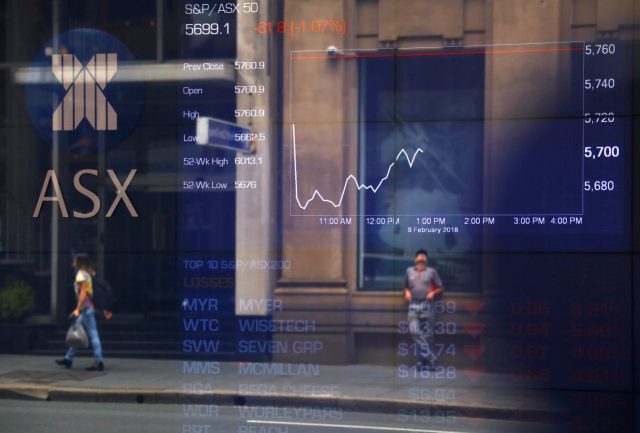
TOKYO — Asian stocks tumbled to two-month lows on Friday after Wall Street shares suffered yet another big slide in the face of rapidly-rising bond yields, with perceived havens such as the yen and Swiss franc in demand amid the turmoil.
Japan’s Nikkei sagged 3.3 percent, en route for a weekly loss of 8.9 percent.
MSCI’s broadest index of Asia-Pacific shares outside Japan dropped 2.3 percent to a two-month low.
The index, which had hit a record high on January 29, was on track for its sixth straight day of losses and stood to lose about 7.7 percent on the week.
Australian shares lost 1.15 percent and South Korea’s KOSPI fell 1.7 percent.
Hong Kong’s Hang Seng shed 2.8 percent and Shanghai retreated 2.85 percent.
“The correction phase in equities could last through February and possibly into March,” said Masahiro Ichikawa, senior strategist at Sumitomo Mitsui Asset Management in Tokyo.
“The rise in long-term U.S. yields will have to settle for the correction phase to end. The surge in volatility has also prompted investors to sell risk assets, in turn feeding volatility.”
U.S. markets remained the epicenter of the global sell-off, with the Dow plunging 4.1 percent and the S&P 500 sinking 3.7 percent overnight.
With Thursday’s losses, both the S&P 500 and the Dow slid into correction territory, falling more than 10 percent from Jan. 26 record highs and showing that the dust was yet to settle from the slide that began a week ago.
U.S. stocks began to wobble last Friday after a healthy U.S. labor market report sparked a spike in bond yields and fears of rising inflation which could trigger more central bank rate hikes.
Higher yields are seen hurting equities as they increase borrowing costs for companies and reduce their risk appetite. They also present a fresh alternative to investors who may reallocate some funds to bonds from equities.
The yield on the benchmark 10-year Treasury note rose as high as 2.884 percent on Thursday, just below Monday’s four-year high of 2.885 percent. It last stood at 2.8385 percent.
Treasury yields were pushed higher after the Bank of England said British interest rates probably need to rise sooner, adding to expectations of reduced central bank stimulus globally, compounded by U.S. Senate leaders agreeing to a budget deal that would increase government borrowing.
Treasury yields have been pushed up by the prospect of increased debt issuance to fund fiscal spending under U.S. President Donald Trump, inflation worries, and expectations of the Federal Reserve raising rates sooner and more frequently than was expected.
“An increase in fiscal spending ahead of the U.S. midterm elections has caused the Fed to brace for inflation accelerating and the economy overheating. This led yields higher, ultimately triggering the fall in equities,” said Yoshimasa Maruyama, chief market economist at SMBC Nikko Securities in Tokyo.
It could be up to new Fed Chair Jerome Powell to restore calm in the financial markets, he said.
In currencies, the dollar was little changed at 108.800 yen, having lost 0.5 percent overnight. It was on track to lose 1.5 percent against its Japanese peer on the week.
The Swiss franc was also mostly unchanged at 0.9370 franc per dollar after advancing about 0.7 percent the previous day.
The euro added 0.1 percent to $1.2260.
The dollar index against a basket of six major currencies was flat at 90.238 after touching a two-week high of 90.567 overnight.
The pound rose 0.2 percent to $1.3943. It had reached $1.4067 overnight following the hawkish BoE comments.
Commodity-linked currencies sagged as crude oil prices fell to seven-week lows.
The Canadian dollar traded at C$1.2600 per dollar after weakening to a six-week low of C$1.2615 the previous day. The Australian dollar fell to $0.7766, its lowest since December 28.
U.S. crude futures were down 0.9 percent at $60.58 per barrel after hitting a seven-week trough of $60.27 on Thursday amid fears of rising global supplies after Iran announced plans to increase production and U.S. crude output hit record highs.
Brent crude fell 0.65 percent to $64.38 per barrel.









